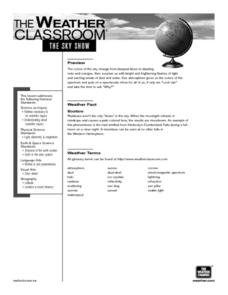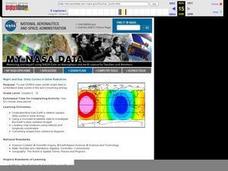Curated OER
Email From Another Planet
In this article about emails and plants worksheet, students read short descriptions about 8 planets in the solar system and then imagine they are visiting one of the planets and send an email to a family member describing their...
Curated OER
Mars
After reading a short excerpt about the planet named after the Roman god of war, Mars, your class will answer four comprehension questions. The activity challenges them to fold over the paper and answer the questions without referring...
Curated OER
Saturn
Looking for a good learning exercise to help teach about the planet Saturn? This learning exercise is for you! An excellent photograph of Saturn accompanies three paragraphs of text. Pupils answer five multiple choice questions based on...
Curated OER
Sky Show
Young scholars participate in a discussion of the sky and colors. They watch a demonstration of how colors can change. They examine the issue of if weather should be a part of their coursework.
Curated OER
Mercury
After reading a short excerpt about Mercury, your class will answer four comprehension questions. The worksheet challenges them to fold over the paper and answer the questions without referring back to the excerpt. An answer sheet is...
K12 Reader
Planets
Readers are asked to identify the main ideas and supporting ideas in a passage about the eight planets in our solar system.
T. Smith Publishing
Earth
Young astronomers read an informational text passage and then answer questions based on what they read.
TLS Books
Neptune
Did you know that Neptune is named after the Roman god of the sea? Young astronomers read about this and other facts about the eighth planet from the sun in a short informational text passage.
TLS Books
Uranus
After reading an informational text passage, learners answer four multiple choice questions about the third largest planet in our solar system.
Curated OER
Tides - The Ins and Outs of Tides
Get your junior oceanographers to generate tidal prediction graphs on an interactive website. They will feel like experts in the field, or shall we say, experts in the ocean! This is a brief, but worthwhile activity that could be used to...
NASA
Collecting Electromagnetic Radiation
Astronomy is literally over your head, but this lesson will explain how we study it. Young scientists make telescopes, calculate and compare the light gathering power of lenses, and simulate detection of infared radiation. Materials...
Glynn County School System
The Outer Planets
Are outer planets just like inner planets? Nope! The outer planets are much more spread apart than the inner planets. An informative PowerPoint presentation shows why this is true as well as facts about the individual planets in the...
Glynn County School System
Light, History, Gravity, Distance, Relativity, and Space-Time
Let the star's color be the guide! The color of a star indicates its temperature and its mass and distance affect the gravitational force. The lesson presentations address these concepts as well as how the theory of special relativity...
Curated OER
Comprehension: Compare and Contrast Topics in Two Texts
A scripted lesson can be a big help for new teachers. This fully scripted three-day learning activity provides teachers with the means to demonstrate how to compare and contrast two topics in two texts. Learners will work as a class to...
American Museum of Natural History
Cosmic Cookies
Scholars read about each planet then bake a plate of cosmic cookies—no-bake cookies decorated to look like the planets; Mercury, Venus, Earth, Mars, Jupiter, Saturn, Uranus, Neptune, and Pluto.
Curated OER
NIGHT AND DAY: DAILY CYCLES IN SOLAR RADIATION
Students examine how Earth's rotation causes daily cycles in solar energy using a microset of satellite data to investigate the Earth's daily radiation budget and locating map locations using latitude and longitude coordinates.
Curated OER
Space Science: Adventure is Waiting
These full-color handouts feature two activities. The first is a reading on comets, meteors, and meteoroids. Your space science learners will examine ten phrases and determine which of the three each characterizes. The second activity...
NASA
Oh, Chute!
Using a scare model of the a test vehicle developed by the Systems Architecture and Integration Office at NASA, groups determine the dimensions for a scale model of the parachute compartment. The groups also determine the volume of the...
International Technology Education Association
Dampen That Drift!
The spacecraft is drifting too far off course! Two games help explain how a spacecraft can use its thrusters to maintain its position. The games have pupils be the components of vectors in order to create and counteract the disturbances.
Scholastic
Lesson One: The Earth, Background and Glossary
How much do you really know about our planet? Middle schoolers build up their prior knowledge about Earth, its placement in the solar system, its composition, and important geological vocabulary with an introductory earth science lesson.
American Museum of Natural History
What is Astronomy?
Go study the universe. Pupils learn seven aspects about astronomy and astronomers. They begin to learn about constellations; distance and motion between objects; gravity; the electromagnetic spectrum; dark matter and energy; and teams of...
American Museum of Natural History
Field Trip Mars
Fly around the Martian surface. Pupils view a presentation on the planet Mars featuring a flyover that shows different views of the surface where rovers have landed and explored on different missions. As individuals watch the images, the...
American Museum of Natural History
Planetary Mysteries
Get to know our little part of the vast universe. Learners read about the common and not-so-common facts about each of the planets in the solar system. The interactive lesson includes a large amount of information as well as a quiz to...
Curated OER
Student Exploration: Eclipse
In this earthquake exploration worksheet, students complete 3 prior knowledge questions, then use "Eclipse Gizmo" to conduct several activities, completing short answer questions when finished.

























